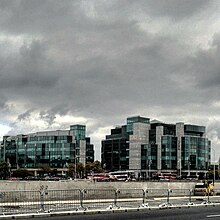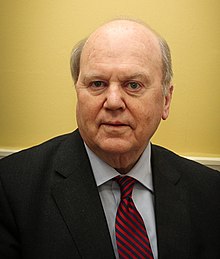
| Part of a series on |
| Taxation |
|---|
 |
| An aspect of fiscal policy |
The Double Irish arrangement was a base erosion and profit shifting (BEPS) corporate tax avoidance tool used mainly by United States multinationals since the late 1980s to avoid corporate taxation on non-U.S. profits.[a] (The US was one of a small number of countries that did not use a "territorial" tax system, and taxed corporations on all profits, no matter whether the profit was made outside the US or not, in contrast to "territorial" tax systems which tax only profits made within that country.)[b] It was the largest tax avoidance tool in history. By 2010, it was shielding US$100 billion annually in US multinational foreign profits from taxation,[c] and was the main tool by which US multinationals built up untaxed offshore reserves of US$1 trillion from 2004 to 2018.[d][e] Traditionally, it was also used with the Dutch Sandwich BEPS tool; however, 2010 changes to tax laws in Ireland dispensed with this requirement.

Despite US knowledge of the Double Irish for a decade, it was the European Commission that in October 2014 forced Ireland to close the scheme, starting in January 2015. However, users of existing schemes, such as Apple, Google, Facebook and Pfizer, were given until January 2020 to close them. At the announcement of the closure, it was known that multinationals had replacement BEPS tools in Ireland, the Single Malt (2014), and Capital Allowances for Intangible Assets (CAIA) (2009):
- Single malt is almost identical to the Double Irish, and was identified with Microsoft (LinkedIn), and Allergan in 2017;
- CAIA can provide up to twice the tax shield of Single Malt, or Double Irish, and was identified with Apple in the 2015 leprechaun economics affair.
US tax academics showed as long ago as 1994 that US multinational use of tax havens and BEPS tools had maximised long-term US Treasury receipts. They showed that multinationals from "territorial" tax systems, which all but a handful of countries follow,[b] did not use BEPS tools, or tax havens, including those that had recently switched, such as Japan (2009), and the UK (2009–12). By 2018, tax academics showed US multinationals were the largest users of BEPS tools and Ireland was the largest global BEPS hub or tax haven. They showed that US multinationals represented the largest component of the Irish economy and that Ireland had failed to attract multinationals from "territorial" tax systems.[f]
The United States switched to a "territorial" tax system in the December 2017 Tax Cuts and Jobs Act (TCJA), causing American tax academics to forecast the demise of Irish BEPS tools and Ireland as an American corporate tax haven. However, by mid-2018, other tax academics, including the IMF, noted that technical flaws in the TCJA had increased the attractiveness of Ireland's BEPS tools, and the CAIA BEPS tool in particular, which post-TCJA, delivered a total effective tax rate (ETR) of 0–2.5% on profits that can be fully repatriated to the US without incurring any additional US taxation. In July 2018, one of Ireland's leading tax economists forecasted a "boom" in the use of the Irish CAIA BEPS tool as US multinationals close existing Double Irish BEPS schemes before the 2020 deadline.
- ^ Adrian Weckler (29 November 2017). "Facebook paid just €30m tax in Ireland despite earning €12bn". Irish Independent. Archived from the original on 21 April 2018. Retrieved 23 April 2018.
- ^ David Ingram (18 April 2018). "Exclusive: Facebook to put 1.5 billion users out of reach of new EU privacy law". Reuters. Archived from the original on 23 April 2018. Retrieved 23 April 2018.
- ^ Simon Bowers (4 November 2016). "Google pays €47m in tax in Ireland on €22bn sales revenue". The Guardian. Archived from the original on 5 April 2018. Retrieved 23 April 2018.
- ^ "Google booked 41% of global revenues in Ireland in 2012; A leprechaun's gold?". Finfacts.ie. 30 September 2013. Archived from the original on 13 December 2017. Retrieved 6 November 2018.
- ^ Cite error: The named reference
pearsewas invoked but never defined (see the help page). - ^ Arthur Beesley (31 January 2018). "Ireland enjoys tax boom but fears a reckoning: Dublin concerned about reliance on revenue from small group of multinational companies". Financial Times. Archived from the original on 5 July 2018. Retrieved 26 September 2018.
Cite error: There are <ref group=lower-alpha> tags or {{efn}} templates on this page, but the references will not show without a {{reflist|group=lower-alpha}} template or {{notelist}} template (see the help page).